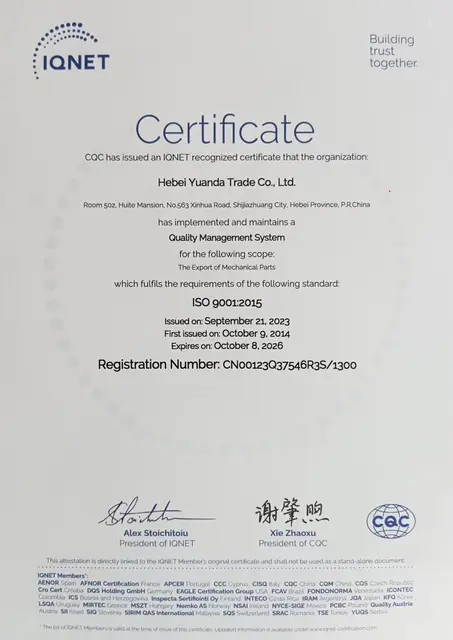Mobile:+86-311-808-126-83
Email:info@ydcastings.com
water pump casing
The Significance of Water Pump Casing in Modern Engineering
Water pumps play a crucial role in various sectors, including agriculture, construction, and municipal water supply. At the heart of these pumps lies the water pump casing, an integral component that significantly impacts the efficiency and longevity of the pump system. This article delves into the importance, materials, and design considerations of water pump casings.
Understanding Water Pump Casing
The water pump casing is essentially the enclosed shell that holds the pump's internal components, including the impeller and volute. Its primary function is to direct the flow of water into and out of the pump while maintaining structural integrity under pressure. A well-designed casing ensures optimal hydraulic performance and minimizes energy loss, contributing to the overall efficiency of the pump.
Materials Used in Pump Casings
Water pump casings are constructed from a variety of materials, each chosen for specific applications and environmental considerations. Common materials include
1. Cast Iron Known for its strength and durability, cast iron is a traditional choice for water pump casings. It can withstand high pressure and is resistant to wear and corrosion, making it suitable for heavy industrial applications.
2. Stainless Steel This material offers excellent resistance to corrosion and is ideal for applications involving aggressive fluids. Stainless steel casings are commonly used in sewage and wastewater pumps, where exposure to harsh conditions is frequent.
3. Plastic In applications where weight is a concern or where corrosion is a significant factor, plastic casings may be used. They are lightweight and resistant to various chemicals, but they may not have the same strength as metal casings.
water pump casing

4. Bronze and Brass These materials are often used for smaller pumps or in applications where aesthetics are important. They provide good corrosion resistance and are also compatible with potable water systems.
Design Considerations
Designing an efficient water pump casing involves various technical considerations
1. Hydraulic Design The shape and dimensions of the casing directly affect the hydraulic performance of the pump. Engineers must carefully calculate the volute design to ensure smooth flow and reduce turbulence.
2. Pressure Rating Depending on the application, the casing needs to be designed to withstand specific pressure levels. Proper material selection and manufacturing processes are essential to maintain safety and functionality.
3. Maintenance and Accessibility A well-designed casing should allow for easy inspection and maintenance. Features such as access ports and removable covers can facilitate repairs and prolong the life of the pump.
4. Temperature Resistance Pumps operating in extreme temperatures require casings capable of withstanding thermal expansion and contraction. This is particularly important in industrial processes where temperature fluctuations are common.
Conclusion
The water pump casing is a vital component in ensuring the efficiency and reliability of pumping systems. By understanding the materials, design considerations, and the role of casings in hydraulic performance, engineers can optimize pump systems for various applications. As technology advances, the continuous improvement in casing design and materials will undoubtedly enhance the performance and durability of water pumps, catering to the ever-increasing demands of modern industries.
-
Impeller Technology That Powers Precision in Pump SystemsNewsMay.22,2025
-
Valve Durability Begins with Quality Cast Iron ComponentsNewsMay.22,2025
-
Performance Cooling with Advanced Automobile Water Pump SolutionsNewsMay.22,2025
-
How Motor Housing and Oil Pans Shape Engine PerformanceNewsMay.22,2025
-
How Metal Castings Drive Modern Manufacturing EfficiencyNewsMay.22,2025
-
Exploring the Engineering Behind Valve Body CastingsNewsMay.22,2025











